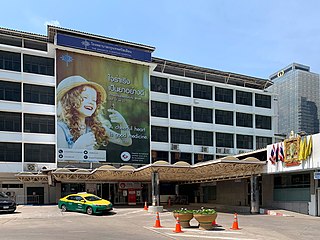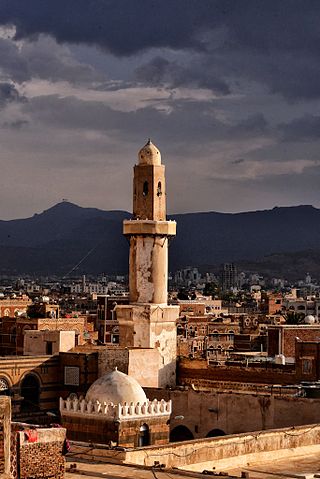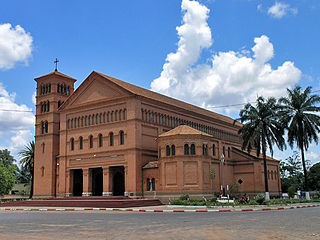Related Research Articles
A Christian mission is an organized effort to carry on evangelism or other activities, such as educational or hospital work, in the name of the Christian faith. Missions involve sending individuals and groups across boundaries, most commonly geographical boundaries. Sometimes individuals are sent and are called missionaries, and historically may have been based in mission stations. When groups are sent, they are often called mission teams and they undertake mission trips. There are a few different kinds of mission trips: short-term, long-term, relational and those that simply help people in need. Some people choose to dedicate their whole lives to mission.

The Catholic Church in Yemen is part of the worldwide Catholic Church, under the spiritual leadership of the Pope in Rome.

Jordan contains one of the oldest Christian communities in the world, their presence dating back to the crucifixion of Jesus Christ early in the 1st century AD. Christians today make up about 3% of the population. Jordanian Christians in a country of almost 10 million are thought to number 250,000-400,000, down from 20% in 1930, but their absolute numbers have increased. This is due to high immigration rate of Muslims into Jordan, higher emigration rates of Christians and higher birth rates for Muslims. All Christian religious ceremonies are allowed to be publicly celebrated in Jordan.

Christianity is the religion of 6% of the population of Djibouti. Christians are mostly of Ethiopian and European ancestry. Most Christians are Ethiopian Orthodox or Roman Catholic. The constitution of Djibouti includes freedom of religion, although Islam is the state religion. There is a tolerant attitude between religions in general. Proselytizing by any faith in public is not allowed.

Christianity is a minority religion in Yemen. The Yemeni constitution mentions religious liberty. There are three churches in Aden.

The Christian community in Qatar is a diverse mix of European, North and South American, Asian, Middle Eastern and African expatriates. In 2023, they form around 15.4% of the total population. Many of them are from the Philippines, Europe, and India. Most Christians in Qatar are not Arab Christians.

According to the 2012 census, 6% of the population of Sri Lanka was Christian; of these, one in ten was Protestant, showing that there were approximately six Protestants for every 1,000 Sri Lankans. Later estimates suggest that this share has doubled in less than ten years.
Protestants are about 2,009,374 in Sudan. They are forbidden to proselytize. The law makes apostasy punishable by death. The southern ethnic groups fighting the civil war largely are followers of traditional indigenous religions or Christians.

Christianity was first introduced to Thailand by European missionaries. By 2021, it represented 1.2% of the predominantly Buddhist national population. Christians are numerically and organizationally concentrated in northern Thailand, where they make up an estimated 16% of the population in some lowland districts and up to very high percentages in tribal districts.
Qatar has a population of approximately 3 million people. About 13.7% are Christian. This includes a large number of migrant workers who follow Catholic, Orthodox or Protestant beliefs. In 2000, the number of Protestants was estimated at 1% of the population and the Anglicans (being classified otherwise there) at 1.4% for the same year.
Protestants in Japan constitute a religious minority of about 0.45% of total population or 600,000 people in 2020.

The Diocese of Cyprus and the Gulf is one of four dioceses in the Episcopal Church in Jerusalem and the Middle East, a province in the Anglican Communion. It covers Cyprus and the Arabian Peninsula, Iraq and Yemen. The bishop in Cyprus and the Gulf is the Ordinary of the diocese. In every part of the diocese, except in Cyprus and Iraq, the congregations are largely expatriate, with many Christians from Pakistan, India, Sri Lanka, the Philippines and the African continent. The diocese is linked with the Diocese of Exeter in England and the Diocese of Thika in Kenya. The diocese is divided into the Archdeaconry of Cyprus and the Archdeaconry of the Gulf: Christopher Futcher was collated archdeacon in Cyprus on 7 September 2019. The Rev'd Canon Dr. Michael Mbona, a Zimbabwean serving at St. Paul's in Kuwait, was appointed as Archdeacon for the Gulf, following the retirement of long-serving Archdeacon Bill Schwartz, OBE.

Christianity is the religion of 3.63% of the population of Oman in 2020. Ninety Christian congregations exist in the country.

Yemen is an Islamic country. Nearly all Yemenis are Muslims, The U.S. government estimates that more than 99 percent of the population is Muslim. with approximately 60% belonging to Sunni Islam and 40% belonging to Shia Islam (Zaidi). Amongst the native population, there were approximately 1,000 Christians, and 6 remaining Jews in 2016. However, Pew-Templeton estimates the number of Christians to be as high as 40,000, though most do not publicly identify as such, due to fears of religious persecution. According to WIN/Gallup International polls, Yemen has the most religious population among Arab countries and it is one of the most religious populations world-wide.

Protestantism is a minority religion in the United Arab Emirates.

Christianity is the majority religion of the Democratic Republic of the Congo and is professed by a majority of the population.

Christianity in Taiwan constituted 3.9% of the population, according to the census of 2005; Christians on the island included approximately 600,000 Protestants, 300,000 Catholics and a small number of members of the Church of Jesus Christ of Latter-day Saints.
Christianity in Equatorial Guinea dates back to pre-independence, when Equatorial Guinea was a colony of Portugal and Spain. In 2023 almost 90% of the population are Christian. Of these 71% are Roman Catholics, though there are also a few thousand Protestants, mainly from the Reformed Church, but also Methodists and Presbyterians.

Christianity in Chad arrived more recently than other religions, with the arrival of Europeans. Its followers are divided into Roman Catholics and Protestants and collectively represent 45% of the country's population.
The Missionaries of Charity attack in Aden was a mass murder crime committed by unknown gunmen inside a home for older people in Aden, Yemen on 4 March 2016.
References
- ↑ The Association of Religion Data Archives (ARDA) website, Retrieved 2023-07-06
- ↑ "World Map Religious Liberty Asia West". Archived from the original on 2014-08-04.
- ↑ Aden Airways - Profile of Ion Falconer
- ↑ The British Yemeni Society website
- ↑ DanMission website
- 1 2 3 "International Religious Freedom Report 2006".
- ↑ US State Dept 2022 report
- ↑ "The Ras Morbat Clinic" . Retrieved 2020-08-15.
- ↑ Source of the list: World Christian Encyclopedia, 2001 edition, Volume 1, page 812